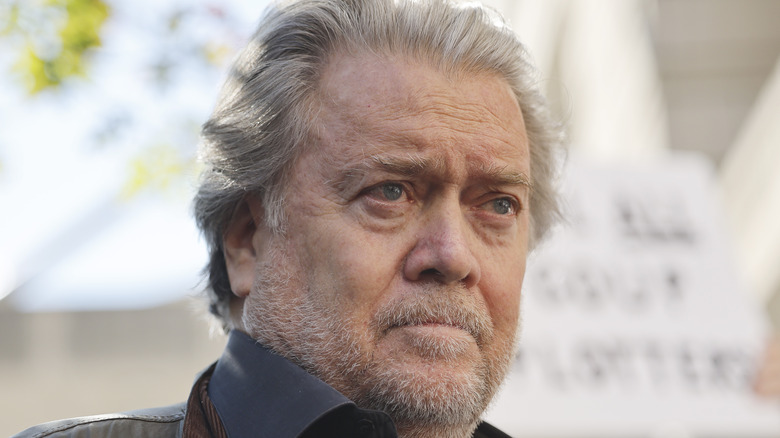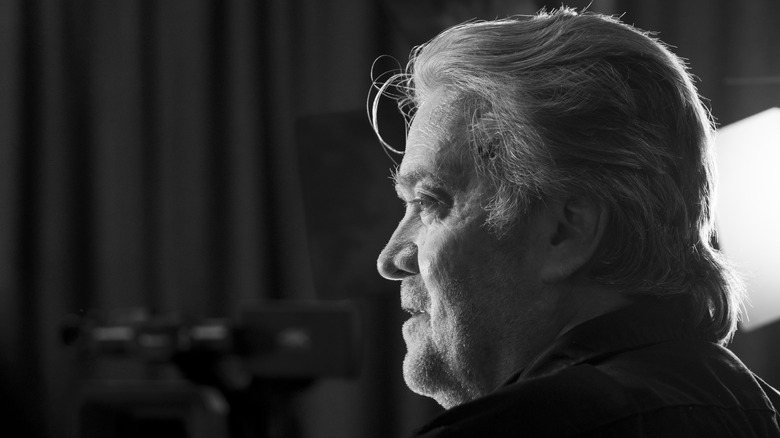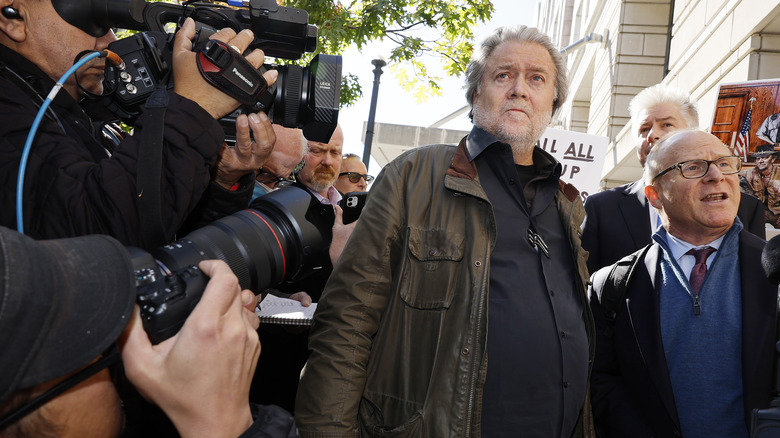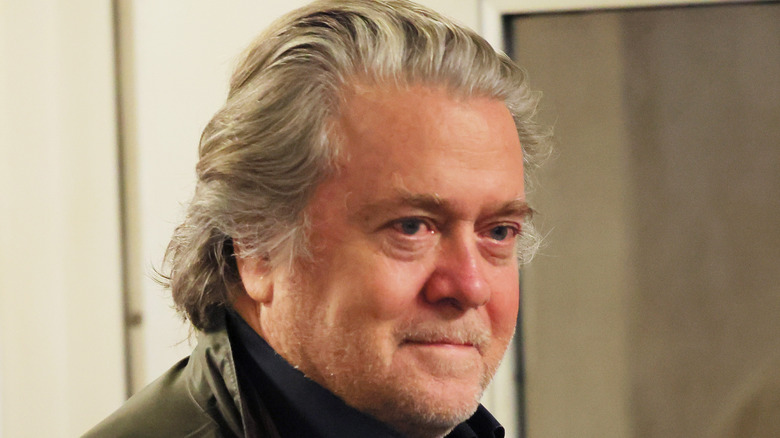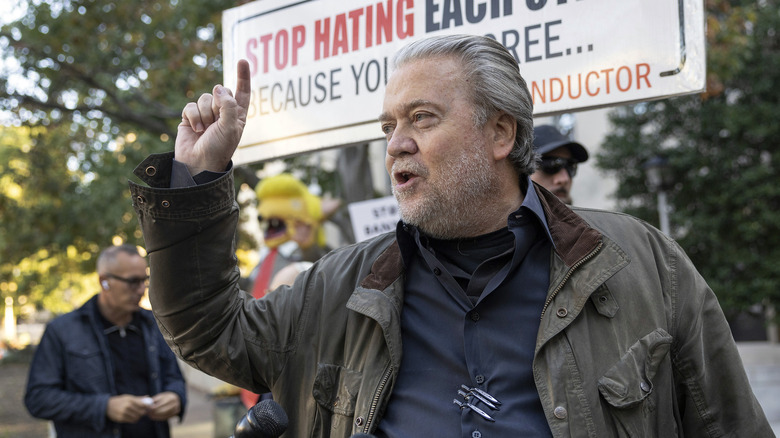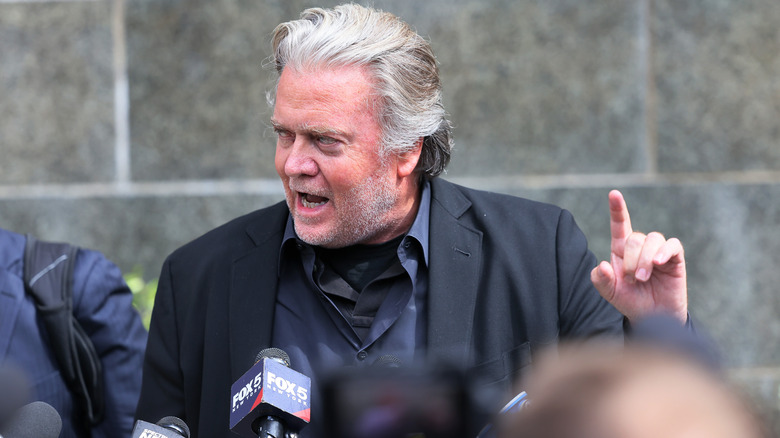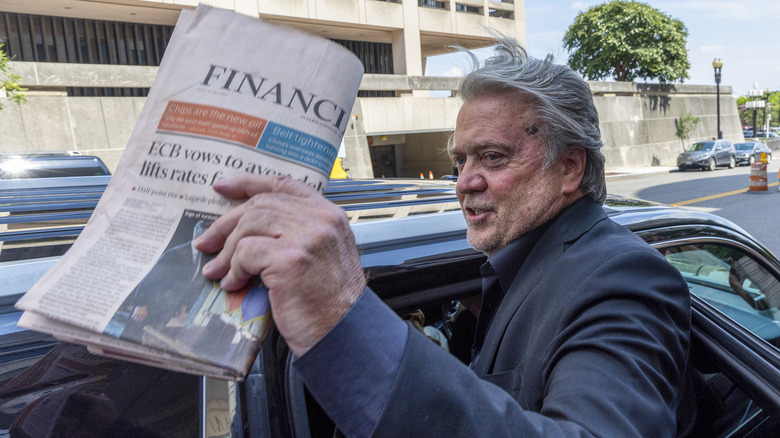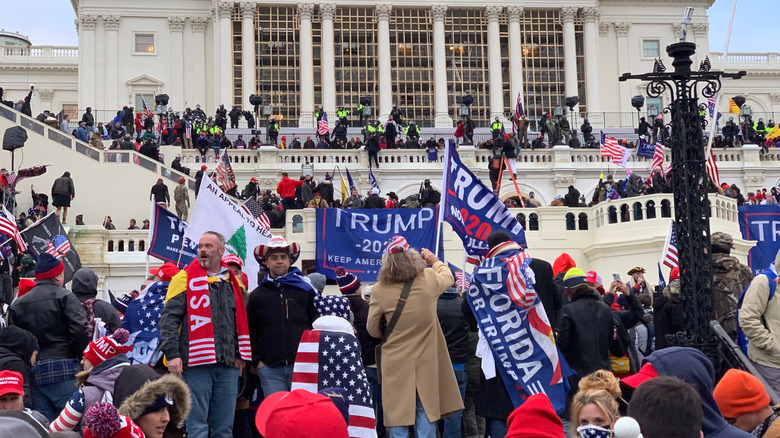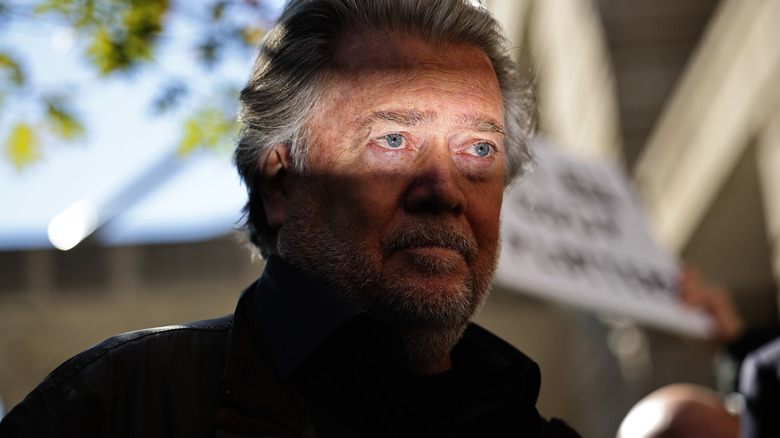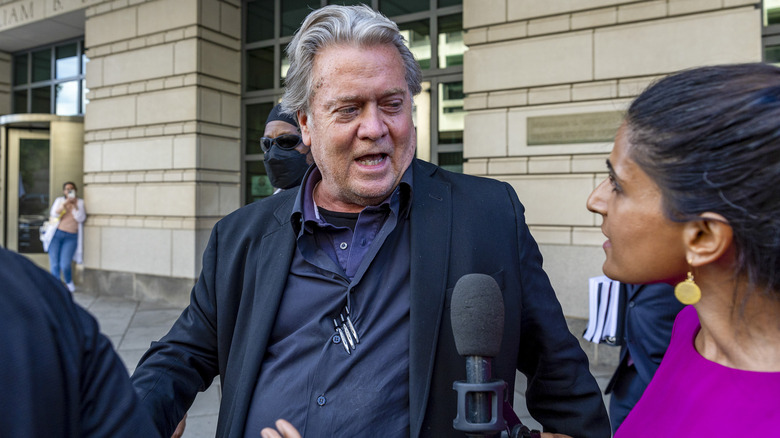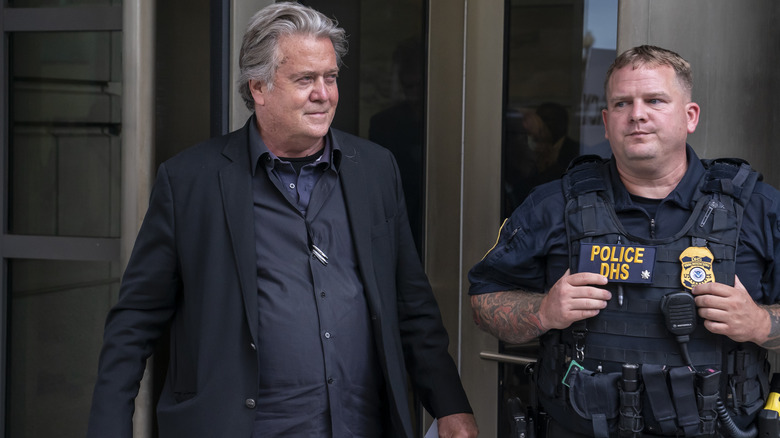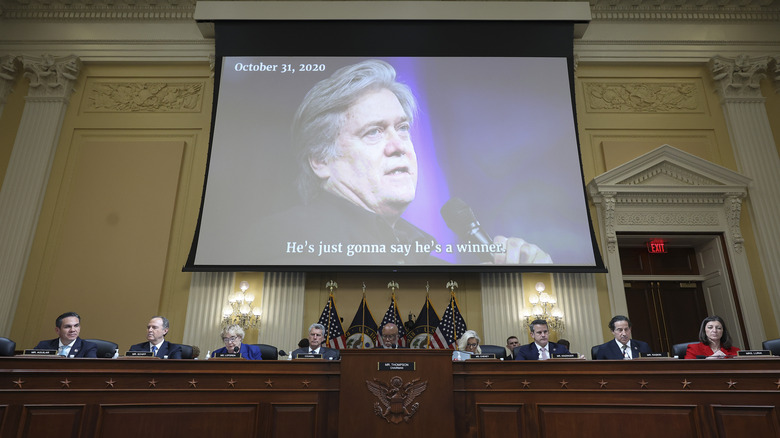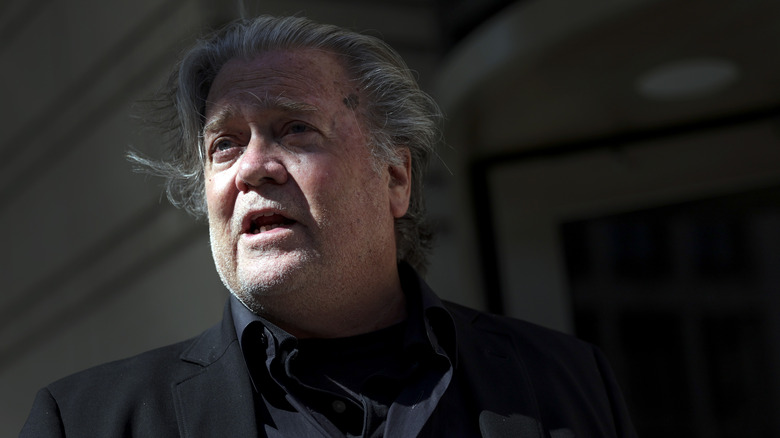Every Steve Bannon Legal Issue Explained
There was a time when everyone was wary about Steve Bannon. His introduction to many in the political world was a 2015 Bloomberg article titled "This Man is the Most Dangerous Political Operative in America." The success of presidential candidate Donald Trump in 2016 only seemed to prove that. Bannon was portrayed as a villain among media outlets (via Slate) and was personified by the Grim Reaper on Saturday Night Live, per Entertainment Weekly. On the surface, Bannon shut down the media depictions of him as unfair and undeserved, but it wouldn't be a surprise if he secretly relished it. He thrived in Trump's dark horse politics and often mocked those who were shocked by its success. He openly took credit for Trump's 2016 victory, reports BBC News.
But Bannon tumbled from his mastermind-designated pedestal far faster than anyone could have imagined, and not a year into Trump's presidency, Bannon was gone. Trump even gifted him a belittling nickname as he did with his enemies: Sloppy Steve Bannon. His descent continued with self-inflicted legal issues and, facing jail time in 2022, Bannon appears to be little more than a political relic. Read on to learn more about the legal issues that brought down Steve Bannon.
He was charged in 1996 for domestic violence
Long before his star-crossed partnership with Donald Trump, Steve Bannon was charged with domestic violence in 1996. It occurred during his short lived and embattled marriage to his second wife (via Politico), Mary Louise Piccard, per the New York Times. Bannon and Piccard were arguing about finances — Bannon refused to give Piccard a credit card to go food shopping — when things got physical. Piccard spat at Bannon, who was trying to drive away in his car, and he retaliated by aggressively pulling her into his car window, grabbing her neck and wrist. Piccard ran back into the house to call police, and Bannon took the phone and broke it. Bannon's actions led to three charges against him: domestic violence, battery, and attempting to dissuade a victim from reporting a crime.
The case was dismissed since Piccard failed to appear in court. The reason, however, does a lot to illustrate Bannon's character: He reportedly threatened her to stay away. According to Piccard, Bannon and his lawyer said that if she pursued the case, she and the twins she had with Bannon only seven months earlier, notes Politico, would be left financially destitute.
He was charged with fraud in 2020
The start of Steve Bannon's recent, long-winded legal troubles began on August 20, 2020, when he was charged with defrauding investors for his "We Build the Wall" fundraiser, reports The New York Times. Unlike his former boss, President Donald Trump, Bannon believed that the administration's flashiest initiative, the building of a wall at the United States' southern border, should be funded privately. He amassed $25 million worth of private donations from hundreds of thousands of donors but used a portion of that amount inappropriately, even though the intiative promised donors that the organizers wouldn't benefit from the proceeds. Their duplicity led to charges of wire fraud conspiracy and money laundering conspiracy, and Bannon pleaded not guilty.
His capture was something out of a network television cop show: Bannon was captured on his friend's 150-foot yacht off the coast of Westbrook, Connecticut. But the law enforcement agency responsible for his arrest wasn't the FBI or even state police; it was the little known U.S. Postal Inspection service, explains The Washington Post. That's right — Bannon was arrested by the USPS.
Steve Bannon lost his passport and right to travel
Steve Bannon was released from custody on August 20, 2020, on a hefty $5 million bond after being charged for fraud, reports CNBC. That wasn't all, however, since the court placed on him other restrictions. He lost his passport and was only allowed to travel to Connecticut, New York, and Washington, D.C. With those travel restraints, it only made sense that the judge forbade him from being able to travel by private jet or yacht, the same vehicle that, according to The Washington Post, he was arrested on.
Bannon, who was accustomed to a luxurious lifestyle (per The New York Times), didn't have to suffer long. On his way out of the White House, Donald Trump issued a last wave of presidential pardons, which included Bannon, reports AP News. But unlike the other convicts on Trump's clemency list, Bannon had yet to face a trial, let alone serve prison time. Usually, the person requesting clemency must wait five years from being released from any sort of confinement imposed on them as a result of a sentence, explains The New York Times. In other words, Bannon should not have been eligible.
His nonprofit was targeted by prosecutors
Federal prosecutors intended on creating a headache for Steve Bannon before President Donald Trump's pardon. They were keen on taking financial power away from the nonprofit at the heart of his "We Build the Wall" fraud, reports ProPublica. Bannon founded "Citizens of the American Republic" in 2017 as a nonprofit to fund several of his pro-Trump media platforms, such as his podcast "War Room." It was through this group that Bannon laundered some money away from the crowdsourced fundraising, which was held on the site GoFundMe, and into his pockets and the pockets of his associates. As part of the 2020 indictment into Bannon, federal prosecutors announced intentions to seize assets from the organization, which had raised $25 million dollars to build a wall at the southern border.
But their case into Bannon's alleged fraud didn't go anywhere due to Trump's pardon in early 2021. However, according to a spokesperson for Bannon, the prosecutors were successful in halting the group's activity since August 2020, via The Daily Beast. Then, in August 2022, the IRS revoked the tax-exempt status of Citizens of the American Republic, due to its failure to file tax returns for three years. The group has been effectively shut down.
The Manhattan DA went forward with the case, anyway
Steven Bannon's pardon from President Donald Trump threw a wrench into the plans of federal prosecutors, who were still preparing a case against Bannon's co-conspirators in the "We Build the Wall" scandal, reports The Washington Post. The prosecutors held onto hope that his indictment would remain, although they agreed that Trump's pardon eliminated the prosecution against him. Afraid that the pardon would provide Bannon with immunity in other cases, they argued that the pardon didn't remove the probable cause that led to his indictment. Bannon's legal team fought for an outright dismissal of the case and for his name to be cleared from the docket, which they eventually received in May 2021 when a federal district court decided in their favor, per The Washington Post. It occurred four months after Trump's pardon.
But Bannon didn't have much room to breathe. Only a month after Trump's pardon, New York state prosecutors also considered having a go at him, per CNN. The Manhattan district attorney's office issued subpoenas to Wells Fargo and GoFundMe in February 2021, two groups involved in Bannon's ill-fated fundraiser. Although Trump could protect Bannon from federal charges, a state investigation is a different ball game, and New York was able to bring a new case with the same allegations.
He faced a new indictment for fraud in 2022 from New York
The Manhattan district attorney's office's efforts to indict Steve Bannon finally came to fruition on September 6, 2022, reports The Washington Post. The prosecutors had begun the case a mere month after Bannon was pardoned by Trump for the same allegations but on federal charges. The clemency put an end to any type of justice he could've received after allegedly defrauding investors over his "We Build the Wall" fundraiser — a multimillion dollar campaign from which he personally, and illegally, profited. This New York state indictment allows for a renewed effort to try Bannon in court over this issue, something that Bannon decried as a partisan exploitation of the criminal justice system in a statement to journalists. He also saw it as an attack on his beliefs and said President Joe Biden tried to assassinate him three times, per Newsweek. He added in a reference to George Soros for good measure.
Bannon surrendered and pleaded not guilty two days later to charges of money laundering, conspiracy, and fraud, according to CNN. His trial is set to begin in November 2023, per Bloomberg News.
He was subpoenaed in 2021 for the January 6 Capitol riot
It was September 2021, and the U.S. House select committee charged with investigating the January 6 Capitol riots that shocked the nation was underway, reports CNN. They issued their first four subpoenas to members of President Donald Trump's inner circle, which included Steve Bannon. Bannon previously served as an advisor to the president, which was reason enough, but comments made on his podcast on January 5 and communication he had with Trump in December, which alluded to the upcoming January 6 date, raised some eyebrows and made him a priority witness for the committee. In his podcast, Bannon warned of the chaos that would occur on the next day, and when he spoke to Trump in December 2020, Bannon told him to prioritize his plans for January 6. It is also the date that Congress formally counts the votes of the Electoral College, notes NPR.
Less than a month after receiving the subpoena and days before he was slated to appear before the committee, Bannon's lawyer announced that he would not cooperate, per CNN. His reason was that he was covered under Trump's executive privilege to withhold information from the committee. Trump's lawyer told Bannon and other White House aides who were subpoenaed not to comply with the committee since it would put privileged material — testimony and documents he wanted to keep private — at risk. But Congress didn't buy it, especially since Bannon had long been a private citizen.
Steve Bannon was held in criminal contempt of Congress
Although Steve Bannon's stance was that he would comply with court rulings on whether to uphold President Donald Trump's executive privilege against the House select committee's subpoenas, he was putting himself at risk by not appearing before the committee, per CNN. The threat of being held in criminal contempt of Congress had already been voiced, and that's exactly what happened. On October 21, 2021, the House of Representatives voted 229-202 to hold Bannon in criminal contempt, according to CNN. The decision now put Bannon in the hands of the Department of Justice and Attorney General Merrick Garland, who had the power to prosecute Bannon for criminal contempt. If found guilty, Bannon would have to pay a fine and/or serve up to one year in prison.
Bannon couldn't say he wasn't warned. House Select Chairman Bennie Thompson said early on that the committee was willing to use the "criminal contempt" option if any of the requested witnesses didn't comply with the subpoenas, reports CNN.
He was indicted by a federal grand jury
Long past the point of no return, Steve Bannon was finally indicted by the Justice Department on November 12, 2021, reports CNN. He faced two charges — one for failing to appear in front of the House select committee investigation on January 6 and one for failing to give over their requested documents. Bannon pled not guilty and waived his right to an arraignment, reports NPR. Afterward, Bannon told reporters that his legal team was going on the offense, threatening to become the "misdemeanor from hell." But Bannon had just received a blow the previous month from the Biden Administration. President Joe Biden refused to exercise executive privilege with the committee's investigation, which would prevent Bannon from testifying, and even informed Bannon's lawyer that they would not back his excuses, per CNN. Bannon previously said that he refused to testify in order to comply with former President Donald Trump's executive privilege.
The indictment was notable for several reasons – one, the last time a case like this occurred, Ronald Reagan was president. Two, many wondered if the Department of Justice was willing to be assertive, and all eyes were on Attorney General Merrick Garland, according to The New York Times.
He lost several pre-trial motions
Steve Bannon threatened to throw the kitchen sink at the prosecution once he surrendered himself and pleaded not guilty, per NPR, but what his legal team ended up doing was anticlimactic and unsuccessful. First, there was Bannon's leading claim that he was protected from testifying before the House select committee to investigate the January 6 Capitol riot because President Donald Trump's executive privilege requested that Bannon wouldn't, notes ABC News. The federal judge presiding over his case, Carl Nichols, rejected the argument since Bannon had not been employed by the White House since 2017, and Bannon was effectively a private citizen. The Justice Department's Office of Legal Counsel previously said that aides to the president were saved from testifying if the president asserted executive privilege, but Nichols concluded Bannon was not eligible, explains The Washington Post. The court rejected an additional defense that Bannon was merely following the advice of his legal counsel, per ABC News.
Bannon's court losses continued when the judge rejected the idea that the House committee was illegitimate because it wasn't formed according to Congressional rules. When Nichols rejected yet another argument that the prosecution would only have to prove that Bannon willfully flouted Congress, his lawyer David Schoen wondered aloud what was the point of a defense.
In a last-ditch effort, he offered to finally testify
Steve Bannon's legal team made it clear that they would attempt to delay the trial for fears that the ongoing, televised January 6 committee hearings would bias potential jurors, reports The Washington Post. Judge Carl Nichols ultimately waved away those concerns and would refuse to delay the trial, but it was these hearings that Bannon suddenly and finally agreed to testify for. The sudden pivot came after former President Donald Trump withdrew his executive privilege and permitted Bannon to testify — the heart of Bannon's public argument for not testifying in the first place, according to ABC News. However, the court rejected that defense and allowed his legal team only the argument that Bannon was confused about due dates, per The Washington Post, it seems as if Bannon's concession was a last-minute effort to get his trial delayed or perhaps thrown out altogether.
Although the move was welcomed by some, like committee member Representative Adam Kinzinger, notes ABC News, it was derided by those with sway in Bannon's trial. The Justice Department said it was nothing more than a stunt (via NBC News), and Assistant U.S. Attorney Molly P. Gaston argued in court that it would set a bad precedent to give in to Bannon's late concession, and Nichols ultimately decided against a trial delay, per The Washington Post.
He was found guilty and sentenced to prison
On July 22, 2022, Steve Bannon was found guilty on two counts of criminal contempt of Congress, reports NPR. The prosecution said his path to guilt was clear and simple and managed to prove that Bannon willfully defied the subpoena that requested his presence before the House select committee charged with investigating the January 6 Capitol riot. But his legal team couldn't surmount the challenges they faced before the trial even began; Judge Carl Nichols struck down several of their defenses beforehand, including Bannon's main argument about President Donald Trump's executive privilege, per ABC News. Bannon's attorney David Schoen said he was confident Bannon's defense would sail in the appeals court, via NPR.
Appealing is Bannon's most attractive option since, on October 21, Bannon was sentenced to four months in prison along with a $6,500 fine, notes CNN. Granted, it's the equivalent of a slap on the hand and is certainly less than what the prosecution was hoping for — the maximum sentence of six months and a $200,000 fine. Bannon has already requested an appeal and was granted 14 days from his sentence to file one.
